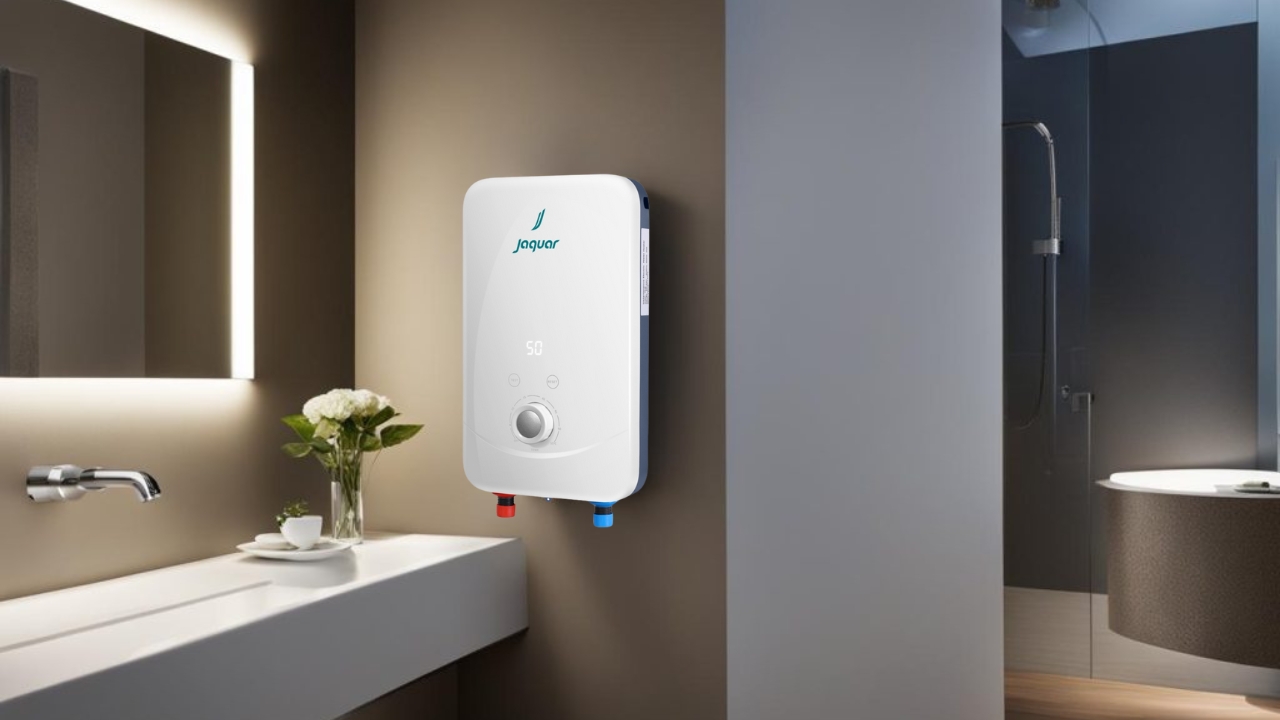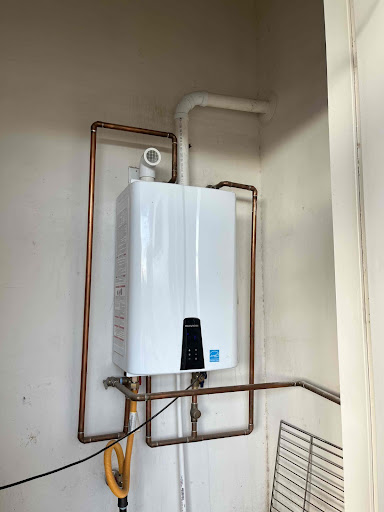Discovering The True Benefits Of On-Demand Water Heaters
Discovering The True Benefits Of On-Demand Water Heaters
Blog Article
This article on the next paragraphs on the subject of Six Benefits of a Tankless Hot Water Heater is especially informative. Read it for your own benefit and figure out what you think about it.

In a world where benefit and effectiveness reign supreme, it's no surprise that house owners are regularly in search of smarter methods to manage their home's energy intake and comfort. One technology that has actually progressively obtained popularity is the tankless water heater. Yet what exactly makes these systems attract attention from the conventional tank-based designs the majority of us matured with? Allow's dive in and discover the advantages of tankless water heaters, helping you choose if it's time to make the button in your house.
Intro
Image this: you enter the shower after a lengthy day, expecting a comforting cascade of hot water, only to be greeted by icy beads due to the fact that the last individual used all of it up. Audio familiar? Standard hot water heater keep a fixed amount of warm water, meaning you go to the grace of that container's supply. Tankless systems, on the other hand, heat water as needed. No more going out mid-shower, no more fumbling with schedules just to ensure hot water is readily available.
Understanding Tankless Hot Water Heater
What Are Tankless Water Heaters?
Tankless hot water heater, often called on-demand or instantaneous hot water heater, offer warm water just as it's required. Rather than keeping gallons of pre-heated water, these units kick right into action the moment you activate the faucet. Water goes through a warm exchanger, heating up in real-time, meaning you obtain an undisturbed flow of hot water without the demand for a big tank resting idly by.
Just how Do They Vary from Standard Systems?
Typical heating units hold a reservoir of warm water, utilizing power to keep that storage tank at a regular temperature level. Tankless units remove the standing supply, lowering squandered power and the bulky impact of a huge cylinder. Basically, you're upgrading from a "stockpile" frame of mind to a "made-to-order" strategy.
Common Kinds Of Tankless Devices
Tankless water heaters normally can be found in two selections: gas and electric. Gas models have a tendency to provide greater circulation rates, ideal for bigger houses, while electric models frequently offer smaller sized homes and are usually less complicated to set up. Additionally, some systems are designed for point-of-use (offering one component) while others can manage the entire home's hot water needs.
Trick Advantages of Tankless Water Heaters
1. Limitless Hot Water Supply
Ever needed to set up showers so every person gets their reasonable share of hot water? With tankless, that becomes a distant memory. As long as the heating unit's flow ability isn't exceeded, you can take back-to-back showers without becoming a popsicle.
2. Power Efficiency and Expense Cost Savings
Say goodbye to warming a titan tank's worth of water and keeping it toasty all the time. Tankless heating systems decrease standby energy losses, which can reduce utility expenses. While the initial cost might be greater, the long-lasting savings frequently warrant the investment.
3. Space-Saving Layout
If your home is short on storage, getting rid of the large container frees up important space. Tankless systems are small and can commonly be installed on walls, hidden in corners, or set up in tight energy wardrobes without hogging the whole room.
4. Longer Life expectancy
A well-maintained tankless hot water heater can outlive its tank-based relative. Traditional storage tanks could last 10-15 years, while tankless models can keep downing along for two decades or more, making them a strong investment in time.
5. Improved Water High Quality
Saving water in a tank can in some cases cause debris build-up or a somewhat "off" taste. With tankless systems, fresh water is warmed right away, decreasing the opportunities of debris accumulation and potentially providing cleaner-tasting water.
Factors to consider Before Switching
Though the advantages are compelling, it's a good idea to consider a few variables prior to totally dedicating.
Preliminary Investment Prices
Tankless heating units commonly include a higher ahead of time price. In between the system itself and prospective installment adjustments, the initial expense could provide you sticker shock. However remember to see it as a lasting investment.
Installment Requirements
Relying on your home's infrastructure, you may require added electric capability or gas line upgrades. Ensure you understand the installation demands and consult with an expert to stay clear of shocks.
Evaluating Your Home's Water Usage Patterns
If your home all at once makes use of numerous fixtures with high hot water demand, make sure the unit's flow price meets your needs. Knowing your use patterns aids you choose the best dimension and kind of tankless heater.
Upkeep and Care Tips
Tankless systems are relatively reduced upkeep, however they aren't set-it-and-forget-it appliances.
Normal Cleaning and Descaling
Hard water minerals can accumulate in the warm exchanger, impacting performance. Routine descaling (typically recommended every year) keeps the system running at peak performance.
Yearly Specialist Inspections
A yearly checkup from an expert guarantees minor problems are captured early. They'll analyze the unit's efficiency, search for leaks, and aid preserve optimum efficiency.
Making Sure Correct Air Flow
For gas models, proper ventilation is important to securely get rid of exhaust gases. See to it airing vent systems are tidy and properly set up to avoid any potential safety hazards.
Contrasting Different Brands and Versions
Not all tankless water heaters are developed equivalent.
Investigating Trustworthy Suppliers
Look for trustworthy brands with a background of producing quality devices. A trustworthy producer often provides far better client assistance and longer guarantees.
Checking Out Reviews and Customer Responses
Customer testimonials and feedback from next-door neighbors or good friends that have actually gone tankless can provide beneficial understandings. Sometimes, real-life experiences can be much more informing than marketing pamphlets.
Setup: Do It Yourself or Specialist?
While some homeowners cherish tackling jobs themselves, tankless installment may not be the best time to burst out the toolbox.
Pros and Cons of Do It Yourself Installation
A do it yourself set up can save cash, but it includes threats. Inaccurate installation can cause ineffectiveness or safety and security problems. If you're handy and have experience, it may be feasible-- yet wage care.
When to Call a Professional Plumbing Technician
For a lot of, calling a pro makes certain everything's done properly. A professional plumbing technician understands regional codes, sizing needs, and airing vent parameters, decreasing the threat of mishaps.
Maximizing Efficiency
You have actually bought a tankless device-- currently maximize its efficiency.
Optimal Temperature Level Setups
Many people establish their systems between 120-140 F. Changing the temperature can improve convenience and cost savings. Experiment to locate a wonderful area that doesn't throw away energy.
Pairing with Low-Flow Fixtures
Wish to stretch your system's capabilities? Think about mounting low-flow showerheads and taps. They lower water usage, allowing your tankless system to supply a constant stream of warm water without straining.
Ecological Effect
Tankless hot water heater line up with greener living objectives.
Minimized Carbon Footprint
By utilizing less power and just heating water as required, tankless systems can reduce your home's carbon footprint, minimizing your environmental influence.
Saving Natural Resources
Much less energy usage and much less lost hot water convert into fewer natural deposits being made use of, an environmental win-win.
Who Benefits Many from Tankless Heating systems?
The appeal of tankless heating systems is that they can match a selection of houses.
Huge Family Members vs. Solitary Passengers
Big households could like the limitless warm water supply, while single owners appreciate the power financial savings from not heating a whole tank for simply one person's morning shower.
Property Owners with Restricted Area
If your home is short on square video footage, losing the bulky tank frees up area for various other essentials-- or maybe simply a lot more elbow room.
Eco-Conscious Consumers
Going tankless aligns with eco-friendly worths, guaranteeing you're not squandering energy or sources.
Future Patterns in Tankless Water Heaters
The globe of home appliances is ever-evolving, and tankless water heaters are no exemption.
Smart Home Integration
Visualize adjusting your water heater's temperature level using an app or getting maintenance informs on your phone. As clever home technology advancements, we'll see even more connectivity and ease.
Improvements in Technology
R&D is constantly enhancing heat exchangers, making devices a lot more reliable and sturdy. Future designs may be also quieter, extra compact, and much better suited for differing climates.
Conclusion
Choosing a tankless water heater is more than simply updating your home's warm water system; it's buying long-lasting convenience, energy effectiveness, and a greener way of life. By considering your household's water use, being mindful of installation demands, and committing to normal maintenance, you can appreciate a consistent stream of hot water without the luggage of a bulky storage tank. As technology progresses, you can anticipate also smarter, much more efficient tankless services that not only make your life easier but also profit the world.
Pros and Cons of Tankless Water Heaters
Tankless Water Heater Pros
Saves Energy: Simply put, you re spending less energy to create hot water, so your total carbon footprint goes down, not to mention your bills. Lasts Longer Than Storage Tanks: Storage tank units need to be replaced every 15 years or so. But tankless units? They can last for 30 years before they give out on you. Constant Hot Water: Need to take a shower and don t want the water running cold? Awesome it won t. The water will stay hot the entire time because it creates hot water on demand. Saves You Money: Less water usage equals less money. Beyond that, you re not paying to keep water hot 24/7. Those savings add up quickly. Better for the Environment: Less water waste is better for everyone. It saves you money, but it s also environmentally conscious at the same time. Tankless Water Heater Cons
It Can Take a Minute: Depending on your specific unit and its placement, it can take anywhere from 10 seconds to 2 minutes to fully heat up. Because there s no storage tank, it heats water as you need it. Upfront Purchase Price: While we talked about their longevity, there s sticker shock when you look at brand-new tankless units to install. It pays for itself, but it s still a big chunk of change at first. Has its Limits: If you run multiple appliances at once, such as the dishwasher, washing machine, and maybe you take a shower at the same time, there might not be enough hot water. https://www.airsouthnow.com/blog/water-heater-service/pros-and-cons-of-tankless-water-heaters/

As an avid reader about Why You Should Consider a Tankless Water Heater, I think sharing that segment was a smart idea. So long as you enjoyed our article please do not forget to pass it around. Thanks so much for going through it.
Call Today Report this page